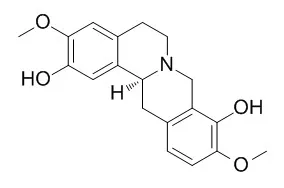| In vitro: |
| Nat Prod Commun. 2016 Jun;11(6):753-6. | | Cytotoxicity of Naturally Occurring Isoquinoline Alkaloids of Different Structural Types.[Pubmed: 27534109] |
METHODS AND RESULTS:
Forty-six isoquinoline alkaloids, of eleven structural types isolated in our laboratory, have been evaluated for their cytotoxicity against two cancer cell lines (Caco-2 and Hep-G2 cancer cells), as well as against normal human lung fibroblast cells. Only Scoulerine, aromoline, berbamine and parfumidine showed significant cytotoxic effects, but only Scoulerine was active against both Caco-2 and Hep-G2 cells (IC50 values 6.44 ± 0.87 and 4.57 ± 0.42, respectively). Unfortunately, except for parfumidine, the other active alkaloids were also cytotoxic to the normal human lung fibroblast cells. | | J Ethnopharmacol. 2012 Aug 30;143(1):310-3. | | Antimalarial alkaloids from a Bhutanese traditional medicinal plant Corydalis dubia.[Pubmed: 22796506] |
METHODS AND RESULTS:
Corydalis dubia is used in Bhutanese traditional medicine as a febrifuge and for treating infections in the blood, liver and bile which correlate to the signs and symptoms of malarial and microbial infections.A systematic extraction and isolation protocol yielded one new natural product, dubiamine, and seven known isoquinoline alkaloids, Scoulerine, cheilanthifoline, protopine, capnoidine, bicuculline, corydecumbine and hydrastine.
CONCLUSIONS:
Among the four alkaloids tested, Scoulerine showed the best antiplasmodial activity with IC(50) values of 5.4μM and 3.1μM against the antifolate sensitive and the multidrug resistant P. falciparum strains: TM4/8.2 and K1CB1, respectively. None of the alkaloids tested showed significant antimicrobial or cytotoxicity activities. |
|






 Cell. 2018 Jan 11;172(1-2):249-261.e12. doi: 10.1016/j.cell.2017.12.019.IF=36.216(2019)
Cell. 2018 Jan 11;172(1-2):249-261.e12. doi: 10.1016/j.cell.2017.12.019.IF=36.216(2019) Cell Metab. 2020 Mar 3;31(3):534-548.e5. doi: 10.1016/j.cmet.2020.01.002.IF=22.415(2019)
Cell Metab. 2020 Mar 3;31(3):534-548.e5. doi: 10.1016/j.cmet.2020.01.002.IF=22.415(2019) Mol Cell. 2017 Nov 16;68(4):673-685.e6. doi: 10.1016/j.molcel.2017.10.022.IF=14.548(2019)
Mol Cell. 2017 Nov 16;68(4):673-685.e6. doi: 10.1016/j.molcel.2017.10.022.IF=14.548(2019)